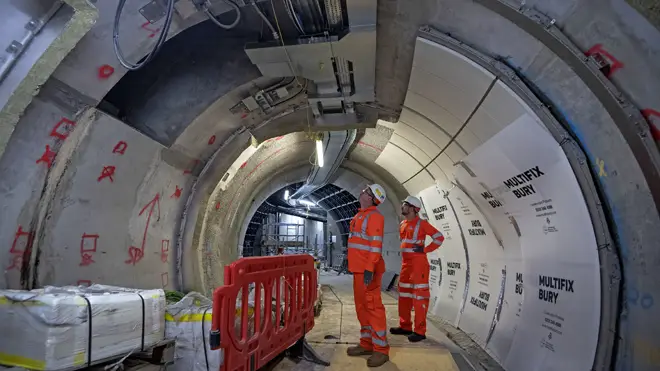
Henry Riley 7pm - 10pm
10 January 2020, 11:03

The hidden costs of the Crossrail project have been revealed in an exclusive analysis by LBC News.
It emerged today that the central part of the Elizabeth line will open in the summer of 2021, a few months earlier than expected.
Crossrail bosses said today that the project is making “good progress” with most stations nearing completion and the central section between Paddington and Abbey wood is set to open next summer and not towards the end of 2021 as had previously been thought.
Full services are expected to start by mid 2022.
Latest update for @elizabethline services through central London expected to commence in summer 2021.
— Crossrail Project (@Crossrail) January 10, 2020
#Crossrail press statement in full here: https://t.co/Whua0KTQAj pic.twitter.com/DOTCoxV2l2
The project is almost three years behind schedule and is estimated to have cost at least £18bn.
The budget for the project was set at £15.9 billion in 2007, but it is now expected to cost an estimated £18.25 billion.
TfL has lost between £500 million and £750 million in passenger revenue due to the delays, but the impact of the delay is also hurting the retail and property sectors and other revenue streams for TfL.
Crossrail is partly funded by some businesses paying extra rates.
One of the ways it was sold to businesses on the route is that it would drastically increase customer footfall. As a result firms would have been expecting a major uplift, and may have planned accordingly.
The New West End Company, a group which represents 600 businesses in London, has calculated that every year of delay to Crossrail costs businesses in the West End £1bn.
Rowena Howie owns a small business, the Revival Retro Boutique in Fitzrovia.
She moved there partly in expectation of a new Crossrail Station at Tottenham Court Road. “The delays mean the cost of doing business here is really taking its toll,” she told LBC.
“I’m paying rent and rates that are extraordinarily high, that would basically account for this extra benefit from Crossrail that we should have, but we just don’t. I think there are going to be people who might look at relocating.”
The average residential property along the Crossrail line has doubled in value since 2008. However in the last year, since delays were announced, there is evidence of a significant drop off.
Research from estate agent Savills, seen by LBC, looked at property prices within 500m of a Crossrail station in 2019.
In two thirds of cases, these areas declined by more than the inner London average of 1.8%. Some by significantly more.
“People have sat on their hands a bit, they’ve decided they don’t want to sell until the scheme is up and running,” says Lawrence Bowles, Associate Director of Residential Research at Savills, “and so that’s had its impact on perhaps making the market a little bit slower in those locations.”
That said, Mr Bowles, and indeed most property analysts I've spoken to say that Crossrail will still provide a boost to house prices once it opens, so as long as people aren't in a rush to sell, their investment should still pay off.
The Crossrail delay is also having an impact on the rest of London's transport. TfL is relying on the revenue from Crossrail to help balance its books.
It was revealed this week that the delays will cost TfL £1.3bn in lost revenue.
Now LBC News has seen evidence that no fewer than 22 projects proposed in TfL's 2016 business plan have been cancelled or delayed, in large part due to the shortfall caused by Crossrail delays.
They include a new signalling system for the Piccadilly line, upgrades to the Jubilee and Northern lines, a proposed bridge from Rotherhithe to Canary Wharf, and the rebuilding or upgrading of a number of tube stations.
Liberal Democrat Assembly Member Caroline Pidgeon said: “The true cost of Crossrail is not just its rising capital cost and the loss in fare revenue but the growing number of cancelled and postponed transport projects that are taking place to balance TfL’s books. I fear the list of delayed and cancelled projects will continue to grow.”
So whilst it would be impossible to put a definitive number on the total cost of Crossrail delays, even just looking at these three areas, it's clear that it amounts to many billions more than just the headline £3bn budget overspend.